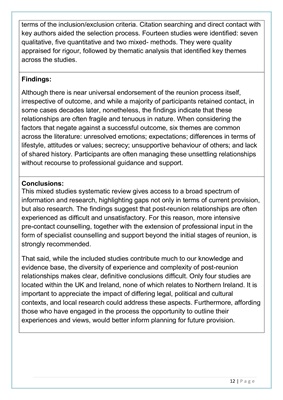
12 | P a g e
terms of the inclusion/exclusion criteria. Citation searching and direct contact with
key authors aided the selection process. Fourteen studies were identified: seven
qualitative, five quantitative and two mixed- methods. They were quality
appraised for rigour, followed by thematic analysis that identified key themes
across the studies.
Findings:
Although there is near universal endorsement of the reunion process itself,
irrespective of outcome, and while a majority of participants retained contact, in
some cases decades later, nonetheless, the findings indicate that these
relationships are often fragile and tenuous in nature. When considering the
factors that negate against a successful outcome, six themes are common
across the literature: unresolved emotions; expectations; differences in terms of
lifestyle, attitudes or values; secrecy; unsupportive behaviour of others; and lack
of shared history. Participants are often managing these unsettling relationships
without recourse to professional guidance and support.
Conclusions:
This mixed studies systematic review gives access to a broad spectrum of
information and research, highlighting gaps not only in terms of current provision,
but also research. The findings suggest that post-reunion relationships are often
experienced as difficult and unsatisfactory. For this reason, more intensive
pre-contact counselling, together with the extension of professional input in the
form of specialist counselling and support beyond the initial stages of reunion, is
strongly recommended.
That said, while the included studies contribute much to our knowledge and
evidence base, the diversity of experience and complexity of post-reunion
relationships makes clear, definitive conclusions difficult. Only four studies are
located within the UK and Ireland, none of which relates to Northern Ireland. It is
important to appreciate the impact of differing legal, political and cultural
contexts, and local research could address these aspects. Furthermore, affording
those who have engaged in the process the opportunity to outline their
experiences and views, would better inform planning for future provision.